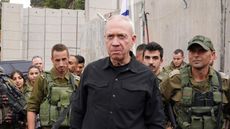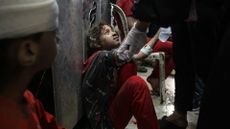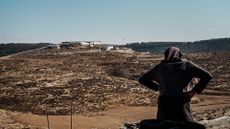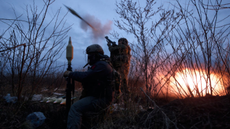What does the Israel-Hamas war mean for security in the UK?
Surge in hate crimes amid pro-Palestinian marches and threat of Iran interference has put security chiefs on alert
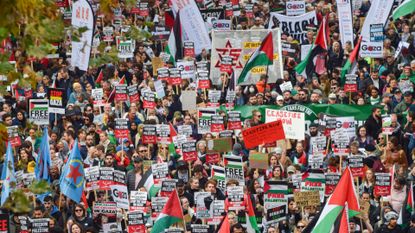
Rishi Sunak has told security forces to prepare for a terrorist attack in the UK, amid fears that the intensifying Israel-Hamas war could provoke further hate crimes or be exploited by rogue states.
Ministers held an emergency Cobra committee meeting on Monday with national security officials and police, the first such meeting since the Hamas attack on Israel on 7 October. The prime minister asked officials to "prepare for and mitigate against the risk of incidents", in the wake of spiralling violence and an escalation in Israeli retaliation. Sources said Sunak asked police and MI5 to conduct "tabletop exercises to simulate our response to potential public order and counter terror scenarios", the Daily Mail reported.
Nearly 100 arrests have been made in London since the conflict began, amid mass pro-Palestinian demonstrations in the capital every weekend calling for a ceasefire. Met Commissioner Mark Rowley predicted that there would be "many, many more arrests" over the next week, as police tracked down people who allegedly breached public order and terrorism laws. Home Secretary Suella Braverman described such demonstrations, in which more than 100,000 people took part, as "hate marches".
Subscribe to The Week
Escape your echo chamber. Get the facts behind the news, plus analysis from multiple perspectives.

Sign up for The Week's Free Newsletters
From our morning news briefing to a weekly Good News Newsletter, get the best of The Week delivered directly to your inbox.
From our morning news briefing to a weekly Good News Newsletter, get the best of The Week delivered directly to your inbox.
What did the papers say?
Britain's most senior police officer said that the events in the Middle East were causing a surge in hate crimes in the UK. "For Jewish communities, it's now about a 14-fold increase in antisemitism in London," Rowley told Sky News's "Sunday Morning with Trevor Phillips" programme, "and for Muslim communities, it's nearly threefold. So this is really precarious."
Rowley also cited a surge in hate crime and terrorism being "accelerated" by state-level threats from Iran.
The FBI has said that "ongoing violence in Gaza looks set to spawn the most significant domestic terrorism threat in years", wrote Charles Lister, senior fellow at the Middle East Institute, for The Daily Telegraph. "That will be even more true in Europe."
The issue of Palestine "used to be a potent rallying cry for jihadists the world over", he said, although in recent years that "fell away". However, "current events risk placing it right back at the forefront again, and this time around, it won't be so locally contained".
Earlier this month, the director general of MI5, Ken McCallum, said his officers were "focused with particular intensity" on a growing risk of attacks within the UK. "Sadly, over the course of my career, it has often been the case that events in the Middle East can then echo in Europe", he told Sky News in a rare interview.
The intelligence service is "absolutely alert to the possibility" that events could cause some in the UK to "attempt some form of attack of whatever sort", McCallum said, ahead of a gathering of heads of intelligence agencies from the UK, US, Australia, Canada and New Zealand in California.
There is "sharpened concern" of threats from far-right antisemitism, Islamophobia, Islamist extremism and aggression from foreign states, McCallum said. "The world is a very uncertain place right now."
Earlier this month Robin Simcox, the Home Office's commissioner for countering extremism, said that "the scale of Iranian-backed activity" in the UK was "underappreciated", as well as "the extent to which Iran attempts to stoke extremism here".
What next?
British counter-terrorism officers are "monitoring closely if Iran will try to exploit the Israel-Hamas war for its own ends in the UK", said The Guardian's defence and security editor Dan Sabbagh, "amid wider anxieties that Tehran is an increasing security menace to dissidents and critics".
Concerns about Russia and China are "well established", but Iran's "campaign of intimidation and harassment has been the most visible development in the domestic threat picture" over the past year.
The fear is "whether Iran will seek to encourage radical groups or even terrorist activities in the UK", Sabbagh said, "although it is not clear there is any evidence of this to date".
However, while such a development would be a "significant step up" in terms of Iranian activity, such is the "intensity of the crisis" that "nothing is being ruled out by insiders".

Continue reading for free
We hope you're enjoying The Week's refreshingly open-minded journalism.
Subscribed to The Week? Register your account with the same email as your subscription.
Sign up to our 10 Things You Need to Know Today newsletter
A free daily digest of the biggest news stories of the day - and the best features from our website
Harriet Marsden is a writer for The Week, mostly covering UK and global news and politics. Before joining the site, she was a freelance journalist for seven years, specialising in social affairs, gender equality and culture. She worked for The Guardian, The Times and The Independent, and regularly contributed articles to The Sunday Times, The Telegraph, The New Statesman, Tortoise Media and Metro, as well as appearing on BBC Radio London, Times Radio and “Woman’s Hour”. She has a master’s in international journalism from City University, London, and was awarded the "journalist-at-large" fellowship by the Local Trust charity in 2021.
-
 Today's political cartoons - December 2, 2023
Today's political cartoons - December 2, 2023Cartoons Saturday's cartoons - governors go Gotham, A.I. goes to the office party, and more
By The Week US Published
-
 10 things you need to know today: December 2, 2023
10 things you need to know today: December 2, 2023Daily Briefing Death toll climbs in Gaza as airstrikes intensify, George Santos expelled from the House of Representatives, and more
By Justin Klawans, The Week US Published
-
 5 hilarious cartoons about the George Santos expulsion vote
5 hilarious cartoons about the George Santos expulsion voteCartoons Artists take on Santa versus Santos, his X account, and more
By The Week US Published
-
 Israel reportedly had actual Hamas attack plan a year before Oct. 7 assault
Israel reportedly had actual Hamas attack plan a year before Oct. 7 assaultSpeed Read Israeli officials considered the intercepted battle plan too ambitious and out of step with their view that Hamas didn't want a war with Israel, documents show
By Peter Weber, The Week US Published
-
 Israel plans next phase of Gaza war as first hostages released
Israel plans next phase of Gaza war as first hostages releasedSpeed read After four-day ceasefire 'we will not stop' until destruction of Hamas, says Israel
By Harriet Marsden, The Week UK Published
-
 Is history repeating itself in Darfur?
Is history repeating itself in Darfur?Today's Big Question Escalation of violence, alleged atrocities and ethnic cleansing in civil war raise fears of genocide akin to 2003
By Harriet Marsden, The Week UK Published
-
 Gaza's Al-Shifa hospital battle: a 'diplomatic failure' for Israel
Gaza's Al-Shifa hospital battle: a 'diplomatic failure' for IsraelTalking Point Window to defeat Hamas is 'closing', warns former Israeli PM, as hospital scenes swing public opinion
By Elliott Goat, The Week UK Published
-
 How war in Gaza is impacting the West Bank
How war in Gaza is impacting the West BankThe Explainer Settler violence against Palestinians surges since 7 October attack in attempt 'to redraw the demographic map'
By The Week UK Published
-
 Ukraine's counteroffensive: has it failed?
Ukraine's counteroffensive: has it failed?Talking Point Russia-Ukraine war has entered period of 'static, attritional warfare'
By The Week UK Published
-
 Why is the US arming Taiwan?
Why is the US arming Taiwan?Today's Big Question Washington approves millions in arms packages to protect diplomatic ally, despite fury from China
By Harriet Marsden, The Week UK Published
-
 Why Palestinians aren't fleeing Gaza during Israel's bombardment
Why Palestinians aren't fleeing Gaza during Israel's bombardmentThe Explainer Israel has urged Palestinians to evacuate northern Gaza as it fights to destroy Hamas, but lots of Palestinians are staying put
By Peter Weber, The Week US Published




